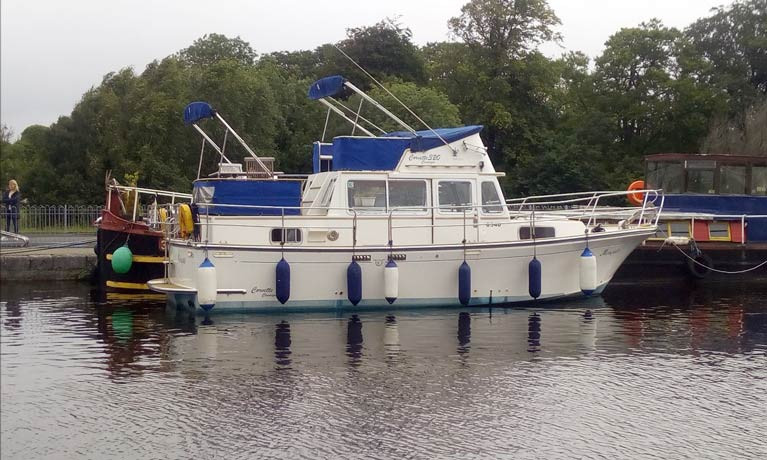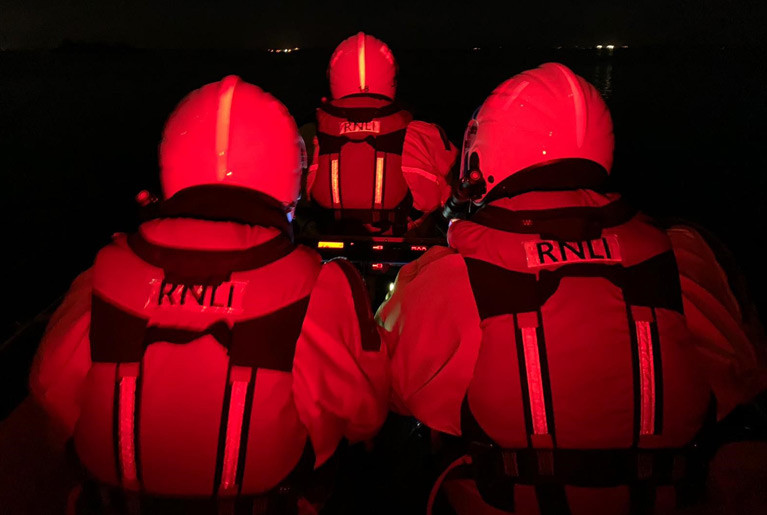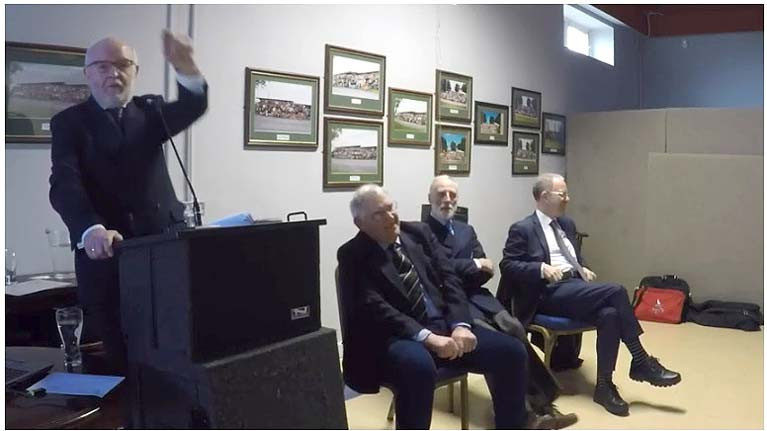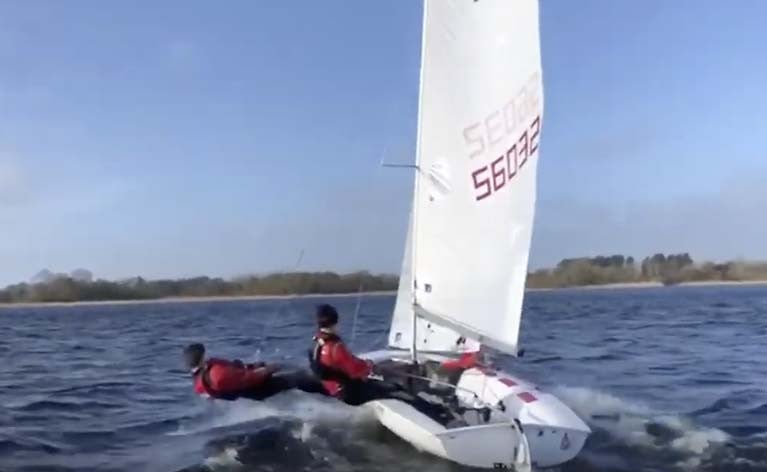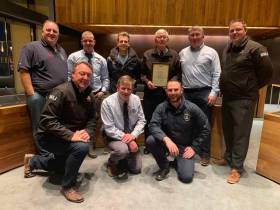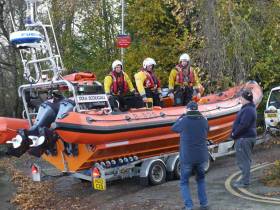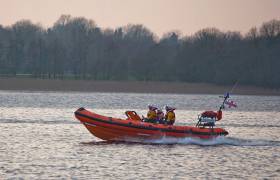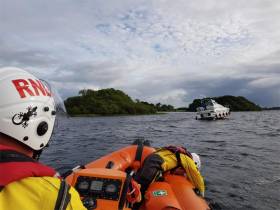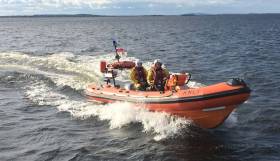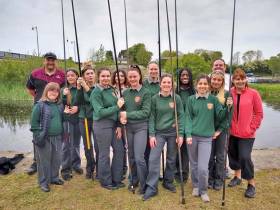Displaying items by tag: Lough Ree
Royal Ulster Yacht Club members John and Sally McKee played a crucial part in their motor cruiser in a dramatic incident on the Shannon waterway last Saturday.
A private cruiser from Limerick was making a passage northwards on Lough Ree but due to a navigational error ran aground on rocks in Cruit Bay, now known as Portrunny, on the western shore of the Lough. Onboard were two adults and three children and the boat suffered serious hull damage.
The Lifeboat was launched within 10 minutes and on station in 30 minutes. By then the children had been transferred to the cruiser's punt, along with the mother of two of the children and an aunt to the third. All were very wet and cold. The McKee's Mosquito offered assistance and stood by the casualty at a safe distance. The lady and children were taken on board Mosquito where Sally and John provided reassurance to the distressed Mum and children along with hot drinks, dry towels and a warm cabin. The Skipper remained on board the stricken vessel in an attempt to save it but eventually took the instructions from the RNLI coxswain and evacuated onto the lifeboat.
The nearest harbour was Portrunny where ‘Mosquito’ safely docked an hour later, keeping the crew onboard until transport was arranged back to Limerick.
Lough Ree lifeboat Operations Manager Tony McCarth said: "The vessel was badly damaged and the salvage pump put onboard was overwhelmed, there was no option other than abandoning the cruiser. The decision to put the mother and children aboard Mosquito was entirely rational as it would have been a very wet cold journey for them in an open RIB".
This was one of two callouts for Lough Ree RNLI who helped a total seven people to safety. The callouts were both to grounded cruisers and gave the lifeboat crew only nine minutes rest between them. The first was to help two people onboard a 27ft cruiser which had run aground near a navigation marker and the second was the incident in which Mosquito was involved.
Lough Ree RNLI brought a drifting motor cruiser to safety on Saturday night.
At 9.35 pm on Saturday, (4 July) Lough Ree RNLI volunteers were requested by Malin Head Coast Guard to reports of a motor cruiser adrift near Portrunny Harbour on the north-west shore of Lough Ree.
The casualty vessel had broken its moorings and drifted out of the harbour with no one on board.
The inshore lifeboat Tara Scougall and her crew quickly found the casualty vessel and brought the boat safely back to the harbour and tied her up before making their return to the lifeboat station at Coosan Point.
Speaking after the call out, Lough Ree RNLI Helm Kieran Sloyan said: ‘Conditions on the lake were very rough with a strong westerly wind. We would like to remind all boat owners to regularly check their mooring lines to ensure their boat is suitably secured. If you do see a boat adrift, please call 999/112 and ask for the Coast Guard.’
Symposium Documents History of Lough Ree Yacht Club
As part of the many events planned to mark the Club’s 250th anniversary, Lough Ree Yacht Club had scheduled a historical talk at the Club on the 15th February 2020, the presentations proved to be very popular with a full house on the day. People travelled from various parts of the country to attend.
The Club was lucky enough to have kicked off their celebrations before the Coronavirus began to impact on events. Subsequently, the Club has had to postpone their flagship celebratory event, Clinkerfest, which is to be run next year instead.
A History of Lough Ree, which took place on the 15th February was a half-day symposium featuring learned historians who spoke on specific but varying topics relating to the history of sailing on Lough Ree. These talks were delivered in a most informative and witty manner which portrayed the calibre of the speakers involved.
A huge thanks to Harman Murtagh who ultimately compiled the event but also to John Keane who chaired the talks and of course to Vincent Delany and Gearoid O’Brien. The Club is most grateful for the contributions.
These presentations (thanks to J Malone) were recorded for posterity on now on youtube and perhaps during these restricted times, people can view and enjoy at their leisure.
A History of Lough Ree Yacht Club, 15th February 2020
- Commodore’s Welcome – Garrett Leech
- Historic Boating on Lough Ree – Harman Murtagh
- Athlone Yacht Club(s), The First 70 Years – Gearoid O’Brien
- Athlone Yacht Club – Vincent Delany
- Ambush at Ballyglass – John Keane
- Historic Boating on Lough Ree – Harman Murtagh
- Eighteen Footers & SODs – Vincent Delany
- Lough Ree Yacht Club, Mid Twentieth Century – Harman Murtagh
- Questions & Answers – Audience & Speakers
The Club hopes that sailing can start again soon and that the continued celebrations of this impressive birthday can recommence! There are some anxious youth and Senior sailors who are keen to get back on the water.
420 Sailors Brave 30-Knots at Lough Ree Yacht Club (Video)
Lough Ree Yacht Club junior sailors were out in force this morning with gusts of up to 30-knots writes Garret Leech.
Note the fine wipeout at 40 seconds into the video below! No children were harmed during the making of this film!
Meanwhile, the adults cowered ashore whispering words of advice into their coffee! The juniors are getting in some practice ahead of the Schull Winter Training and Munster Championships which is run by the Irish International 420 Class Association, this has become an annual pilgrimage for both Parents & Children.
The Club has a vibrant junior scene and has defined an affordable pathway of their own for youth sailing which they strongly advise parents to adhere to, affordability is key to keeping the kids sailing.
Children can either start in Optimist or Mirror and as they advance their skills, they either move to 420 or Laser, sometimes both.
The club has a strong association with double-handed boats which helps keep youth sailing strong post Optimist.
2020 is Lough Ree Yacht Club’s 250th Anniversary and to celebrate junior sailing at the Club, they will again run the successful Double Ree regatta during the weekend of 18th -19th July.
This regatta will host racing for 420s, 29ers, Mirrors and RS Feva and last time run it was dubbed the Electric Picnic of sailing!
Lough Ree RNLI Lifeboat Receive Civic Honour
Lough Ree RNLI together with Athlone Sub Aqua Club have been honoured by the Municipal District of Athlone-Moate on behalf of Westmeath County Council.
The recognition was awarded to the volunteers of Lough Ree RNLI and Athlone Sub Aqua Club as a symbol of acknowledgement of their lifesaving contribution to the community.
Lough Ree RNLI has been operational since 2012 and to date has assisted over 1,000 people, 300 boats and one cow in over 370 call outs.
"Assisted over 1,000 people, 300 boats and one cow in over 370 call outs"
Speaking at the ceremony of recognition, Lifeboat Operations Manager, Tony McCarth thanked the Council for this honour, together with the support they have shown over the years, most especially in providing a location for the Lifeboat Station to call home until the new boathouse is built.
He paid special tribute to his predecessor, Damien Delaney who undertook setting up the operation in Lough Ree. Tony closed his speech with a special word of appreciation for Derry McMahon from Athlone Sub Aqua Club for his many years of service in the community as a diver.
Lough Ree RNLI's New Atlantic 85 Class Lifeboat Arrives at Coosan Point
A new Atlantic 85 class lifeboat, Tara Scougall, has gone on service at Lough Ree RNLI. The lifeboat which arrived at the Coosan Point lifeboat station today, Tuesday 12 November 2019, replaces The Eric Rowse which has been used for rescues and to save lives on Lough Ree since August 2014.
Volunteers have been completing familiarisation training on another Atlantic 85 ahead of Tara Scougall’s arrival and started their training on Tara Scougall this evening.
The new lifeboat has been funded through the fundraising efforts of James Scougall in memory of his late wife Tara Scougall. James and his family wanted a lifeboat station with a strong sense of community and felt that Lough Ree was the perfect choice.
The Tara Scougall will be officially named at a special naming ceremony and service of dedication at Lough Ree Lifeboat station next year.
In her 5 years of service on Lough Ree, The Eric Rowse was launched on service 292 times, with its volunteer lifeboat crew assisting a total of 716 people.
The new lifeboat, an Atlantic 85 design, allows room for four crew members, and it has additional equipment and more advanced features than it’s predecessor, the Atlantic 75 class lifeboat, which it replaces.
The lifeboat is powered by two 115 horse power engines and has a stronger hull and greater top speed of 35 knots. The added radar allows the crew to operate more effectively in poor visibility and there is also VHF direction-finding equipment.
The vessel also has a manually operated self-righting mechanism which combined with inversion-proofed engines keeps the lifeboat operational even after capsize. The lifeboat can also be beached in an emergency without causing damage to its engines or steering gear.
The Atlantic 85 which was introduced to the RNLI fleet in 2005 also carries a full suite of communication and electronic navigation aids, as well as a searchlight, night-vision equipment and flares for night-time operations.
Speaking following the arrival of the new lifeboat, Tony McCarth, Lough Ree RNLI Lifeboat Operations Manager said: ‘We are extremely grateful to James Scougall and his incredible fundraising efforts which have funded our new lifeboat. This is a very exciting time for all our volunteers as we enter a new chapter for the RNLI on Lough Ree. We will be building a new permanent Boat House (Lifeboat Station) for the Tara Scougall to call home in the near future.
‘We are looking forward to being the custodians of this new lifeboat which will allow our volunteers to go on to rescue and to save many more lives in the years to come.’
The RNLI is a charity which relies on voluntary contributions and legacies.
Lough Ree Lifeboat Volunteers Feature In Latest Series Of BBC’s ‘Saving Lives At Sea’
Lough Ree RNLI’s lifeboat volunteers will be showcased on the small screen in an upcoming episode of BBC TV series Saving Lives at Sea.
Tune in to BBC Two on Tuesday 15 October at 8pm to see the Lough Ree crew on two callouts, firstly when they launch to the aid of two fishermen whose boat is swamped during a fishing competition.
Next they’re tasked come to the aid of an elderly man taken ill on the island of Inch Bofin — alongside rescue stories from their colleagues at other stations and beaches around Ireland and Britain’s coasts and inland waters.
Lough Ree’s appearance follows last year’s profile of Courtown’s lifesavers, as previously reported on Afloat.ie.
Lough Ree RNLI helm Tom Bradbury says: “It’s great to see the work we do on TV like this.
“We’re always grateful for the support we get from the public as we rely on donations to do what we do, so it great that all our supporters now get to see, from the comfort and safety of their own front rooms, exactly how they help us save lives.”
Filming for the fourth series of Saving Lives at Sea took place over the past year, with lifeboat crews and lifeguards carrying special cameras and welcoming film-makers into their day-to-day life.
Rescues from the RNLI’s archives are also revisited, and viewers can get a glimpse into the everyday lives of the thousands of men and women who give up their time to save lives.
Viewers in the UK can also watch the series on demand following broadcast on the BBC iPlayer.
Lough Ree Lifeboat Diverts From Training For Two Callouts
Lough Ree RNLI volunteers diverted from a training exercise yesterday evening (Thursday 20 June) on two separate callouts.
While carrying out their regular monthly training on board the inshore lifeboat The Eric Rowse, the RNLI crew were requested by the Irish Coast Guard to assist a person on board a 32ft motor cruiser who had reported having a fire on board.
The casualty had made his own way to Lough Ree Yacht Club, and when the lifeboat arrived on scene the crew spotted smoke coming from the engine bay.
The boat was evacuated and a tow line prepared to move the casualty vessel clear of the marina in case the fire got worse.
Athlone Fire Service were soon on scene and the two crews worked together to assess the situation, identifying an issue with the port-side engine.
When satisfied there was no further risk of fire, the fire service departed and the casualty vessel returned to its home marina using its starboard engine.
While escorting the casualty home, reports came in to the RNLI crew of two people in difficulty on board an inflatable dinghy near Yellow Island, just north of Lough Ree Yacht Club.
The two people were unharmed, but weren’t going to be able to make it ashore themselves. The lifeboat crew brought them safely ashore to Barrymore and gave them safety advice.
Conditions for the evening were dry with good visibility and a variable westerly breeze.
Earlier this week, Lough Ree’s volunteer crew went to the assistance of four people whose boat had gone aground between Carberry and Kid Island to the south of Lough Ree. The four people were uninjured and were brought to Coosan Point.
Speaking yesterday evening, Lough Ree RNLI volunteer helm Tom Bradbury said: “We would like to commend the gentleman whose engine started to smoke on his quick actions in requesting assistance.
“We would like to remind people that it is important to always wear your lifejacket when using the lake and to let someone know where you’re going and when you expect to reach your destination.”
Lough Ree RNLI Search for Suspected Missing Person
Lough Ree RNLI Volunteers assisted in the reach of a suspected missing person who had become separated from the jet ski they were on.
Yesterday, 2 June 2019 at 7.05pm the Irish Coast Guard in Malin Head tasked Lough Ree RNLI together with Irish Coast Guard Helicopter Rescue 118 and other agencies on Lough Ree including Athlone Sub Aqua Club, Lough Ree Sub Aqua Club and Roscommon Civil Defence to search for a person who had called for help after falling from their jet ski. The location of the casualty was unknown and conditions on the lake at the time were very rough with strong winds from the south-west.
All agencies conducted an extensive surface and aerial search for a number of hours with nothing to report. The Irish Coast Guard stood the search down at 10.30pm.
Speaking after the search was stood down, Lifeboat Operations Manager, Tony McCarthy said: “If you are using the lake you should always carry a means of communication, either VHF radio or mobile phone and ensure if they are not waterproof that you have them in a watertight bag so you can call for help easily if and when needed.”
Shannon Angling Hub Warns Of Threats To Its Future
Chronic lack of maintenance of the Lanesboro Angling Hub on the River Shannon at Lougg Ree is putting the amenity at risk, as the Longford Leader reports.
Hub secretary Philip Gordon warned that “several serious issues” are affecting the area’s renowned ‘hot water’ stretch downstream of the ESB plant, including unchecked weed growth, invasive asian clams, nighttime poaching and reduced water levels.
“Year on year the water is getting more shallow, which is less friendly for fish habitats,” he said. “If there is no habitat for the fish, they just won’t come in and then this place is lost as a fishery, which is a crying shame. Once it’s gone it’s gone.”
However, there is some hope for the future, with recent Transition Year outings introducing local young people to the benefits of angling as a “great stress buster”.
The Longford Leader has more on the story HERE.



























